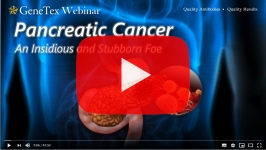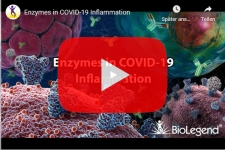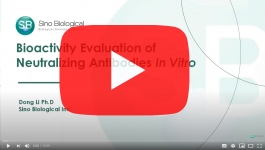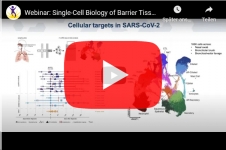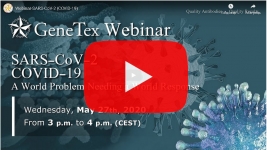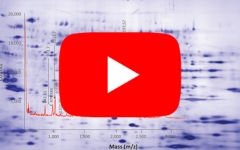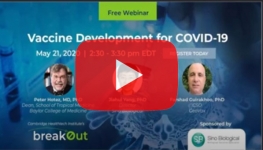Pancreatic Cancer An Insidious and Stubborn Foe
Pancreatic cancer is the third leading cause of cancer-related death in the United States. With a predicted five-year relative survival rate of 9%, pancreatic cancer continues to be clinically challenging due to its resistance to even the most aggressive combinations of surgery, chemotherapy, and radiotherapy. Because of indistinct symptoms and the absence of reliable diagnostic biomarkers, diagnoses ar...
COVID-19 Enzymes in COVID-19 Inflammation
Enzymes catalyze a number of important biological reactions. In the context of SARS-CoV-2, they are vital for viral entry and replication. Learn more about the key enzymes utilized by this virus and potential therapeutics to block them.
COVID-19 Bioactivity Evaluation of Neutralizing Antibodies In Vitro
This webinar discusses the approaches used to screen for SARS-CoV-2 (2019-nCoV) neutralizing antibodies and evaluate their bioactivity in vitro. Speaker: Dong Li, Ph.D., Senior Scientist at Sino Biological Inc.
Ehrlichia Canis In-Clinic Diagnosis
Diagnosis of the tick-borne rickettsia infection, caused by Ehrlichia canis can be challenging due to its different phases and multiple clinical manifestations. In this webinar, you’ll confront this challenge together with Dr. Netta by focusing on the clinical aspects of the disease in general practice, and on how to make the most of common in-clinic diagnostic protocols in conjunction with Serology and PCR....
COVID-19 Single-Cell Biology of Barrier Tissues
In this talk, Dr. Ordovas-Montañes will discuss recent studies utilizing single-cell genomics to comprehensively map the cell types, subsets, and states that compose human barrier tissues. He will present findings related to health and disease in the nasal and intestinal mucosa and recent work to understand the potential cellular targets of SARS-CoV-2 in these tissues. He will also share challeng...
Cell Viability Lysosome Function, Cathepsin Activity, and Cell Viability Techniques
At ICT, we are on a mission to help cure disease and we do that by providing better assays to study lysosomal functionality, cell viability, and cathepsins. Watch this webinar to understand the role of lysosomes and cathepsins, and how they impact cell viability, apoptosis, autophagy, mitosis, and mitochondrial function. What will you learn?
SARS-CoV-2 / COVID-19 A World Problem Needing a World Response
Join GeneTex’s senior scientist Alexander Ball, M.D. for an overview of the scientific and clinical aspects of SARS-CoV-2/COVID-19 along with an introduction to GeneTex’s SARS-CoV-2 and coronavirus catalog of reagents. Content: Origin of SARS-CoV-2 Global situation Biology of SARS-CoV-2 Clinical aspects of&nbs...
SARS-CoV-2 related human proteins Integration of transcriptomics and antibody-based proteomics for cell...
In this webinar, Cecilia Lindskog presents the cell type-specific expression of ACE2 across more than 150 different cell types corresponding to all major human tissues and organs based on stringent immunohistochemical analysis. The results are compared with different datasets both on the mRNA and protein level. She also discusses the importance of integration of transcriptomics and antibody-based proteomi...
Host Cell Proteins (HCP) Immunoassays and Role of Mass Spectrometry in Identification of HCP Im...
A well-developed and broadly reactive HCP ELISA remains a gold standard method effectively used during the purification process to ensure removal of HCPs and to demonstrate process consistency and final drug substance purity. Regulatory guidelines require that sponsors use orthogonal methods for demonstrating antibody coverage to individual HCPs and provide a comprehensive assay qualification package t...
COVID-19 Vaccine development
This webinar, sponsored by Sino Biological and hosted by the Cambridge Healthtech Institute (CHI), informs about the latest research and technologies for COVID-19 vaccine development. Topics and Speakers:


